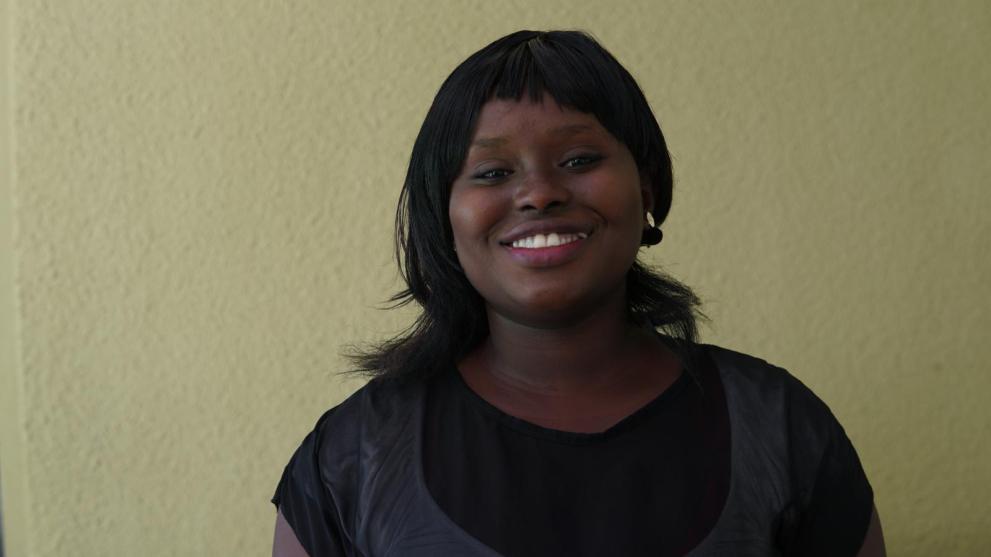
As of 31 August 2019, 4,290 Gambians have been assisted to voluntarily return home under the EU-IOM Joint Initiative for Migrant Protection and Reintegration since the start of 2017. Over 70 per cent of these individuals were returned just from Libya, with another 25 per cent coming home from Niger. The remaining 5 per cent came home from other countries in Africa and Europe.
The country has lost the cream of its young population through this perilous journey. It has led to the trafficking, imprisonment and demise of many young Gambians in Libya and other North African countries. These youngsters could have been breadwinners for their families; they could have been future politicians, ministers and presidents.
25 year old Absa Jallow is one of those lucky migrants who managed to return home. Absa, like many young people in the country, believed that the only way to realize her potential is to leave The Gambia and settle for a new life in Europe, which she regarded as the ‘land of milk and honey’. She quit her job as a secretary and embarked on a journey she had little knowledge about.
‘I decided to quit my job and travel to Nigeria for a more rewarding job in 2012. After sometime, I then moved to Libya, with the intention of entering Europe but I regret why I did not make best use of the money I spent on this misfortunate journey,’ she said.
She was enthused and committed to achieve her dreams by all means. Unfortunately, her dreams faded away as she arrived in Libya. She would become yet another of the many young Gambians subjected to abuse and torture.
‘I experienced the worst moments of my life in Libya. No human being deserves to go through such forms of abuse and maltreatment. It was really horrible,’ she decried.
Even though Absa is happy to return home, she has one big regret that still keeps lingering on her mind. If she had known about all these trials associated with the journey, she would not have gone. For her, five years of her valuable life are wasted and gone forever.
Through support from IOM, she has set up a grocery shop in her home town of Kombo Lamin, about 16 kilometers from the capital, Banjul. Though she desires to expand the business, her greatest satisfaction is having returned home in good state of mind after experiencing the bitterness of life in a foreign land as a migrant woman.
‘I have a very big family and I need to support them financially. I set up a grocery shop because with that, I can get some money from sales on a daily basis,’ she said.
Absa receives medical and psychosocial support from IOM, which is helping her be at peace with herself. For her, the memories of her time in Libya cannot be erased from her mind, but one thing is certain: she has decided to move on and learn from the bad decision she made.
She was captured and sold as slave twice by the bandits in Libya before she finally gained freedom. She narrated the painful and traumatic experience in tears.
The hardships she went through in detention centers were unbearable. As if that was not enough, Absa knew no peace even at her slave master’s custody.
‘I really thank God for my freedom,’ she said.
She decided to return back to The Gambia in October 2017, with support from the International Organization for Migration.
She added: ‘My family was very happy when I returned. They could not believe their eyes when they saw me. Equally, I never thought this day would come. We are happy together now. I wish I had stayed.’
Upon her return, young Absa has shown great resilience. She is working tirelessly to achieve her goal of becoming a successful entrepreneur. Her business continues to grow and she is determined to make a decent living in The Gambia.
‘The business is growing from strength to strength. It is empowering me a lot and I am very happy,’ she delightfully said. Her ambition is to start a restaurant very soon and run it along with the grocery shop.
‘The proceeds from the shop will go to my family and proceeds from the restaurant will go to myself. So I will run them concurrently,’ she planned.
Absa’s message to Gambian youths is for them to stay in the country and work, instead of migrating irregularly. ‘There is less work available for African migrants in Europe and it is better to stay in the country than wasting your time there,’ she advised.
In September 2019, Absa started a course in catering at the Gambia Tourism and Hospitality Institute. The 10-month long programme is sponsored by the Youth Empowerment Project (YEP), funded by the European Union and she was referred to YEP by IOM.
‘All I want is to be the best cook. I can cook Gambian, Nigerian, Indian and Libyan dishes. This is an advantage for me. I know I can do it!’ she said with optimism.
Details
- Publication date
- 22 November 2019
- Region and Country
- The Gambia
- Thematic
- Greater economic and employment opportunities
- Partner
- ITC - International Trade Center
